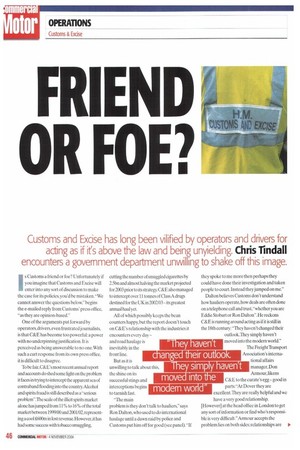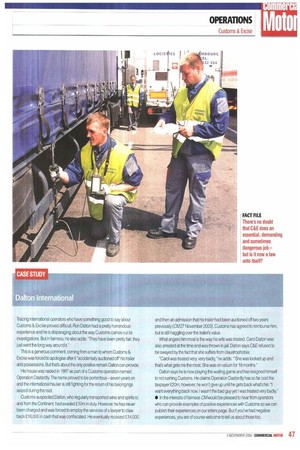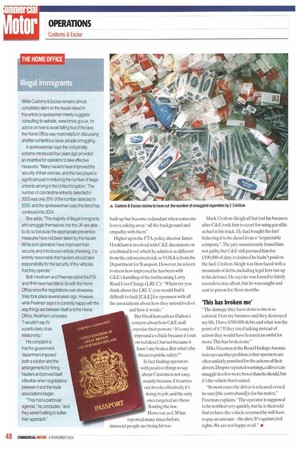FRI E ND R F OE ?
Page 46

Page 47

Page 48

If you've noticed an error in this article please click here to report it so we can fix it.
Is Customs a friend or foe? Unfortunately if you imagine that Customs and Excise will enter into any sort of discussion to make the case for its policies,you'd be mistaken."We cannot answer the questions below," begins the e-mailed reply from Customs' press office, "as they are opinion-based."
One of the arguments put forward by operators, drivers, even frustrated journalists, is that C&E has become too powerful:a power with no underpinning justificationit is perceived as being answerable to no one.With such a curt response from its own press office, it is difficult to disagree.
To be fair, C&E's most recent annual report and accounts do shed some light on the problem it faces in trying to intercept the apparent sea of contraband flooding into the country.Alcohol and spirits fraud is still described as a "serious problem ".The scale of the illicit spirits market alone has jumped from 11% to 16% of the total market between 1999/00 and 2001/02, representing a cool £600m in lost revenue.However,it has had some success with tobacco smuggling, cutting the number of smuggled cigarettes by 2.5bn and almost halving the market projected for 2003 prior to its strategy. C&E also managed to intercept over 11 tonnes of ClassA drugs destined for the UK in 2002/03 —its greatest annual haul yet.
All of which possibly keeps the bean counters happy, but the report doesn't touch on C&E's relationship with the industries it encounters every day — and road haulage is inevitably in the front line.
But as it is unwilling to talk about this, the shine on its successful stings and interceptions begins to tarnish fast.
"The main problem is they don't talk to hauliers," says Ron Dalton, who used to do international haulage until a dawn raid by police and Customs put him off for good (see panel)."11 they spoke to me more then perhaps they could have done their investigation and taken people to court. Instead they jumped on me."
Dalton believes Customs don't understand how hauliers operate, how deals are often done on a telephone call and trust,"whether you are Eddie Stobart or Ron Dalton". He reckons C&E is running around acting as if it is still in the 18th century: "They haven't changed their outlook.They simply haven't moved into the modern world."
The Freight Transport Association's international affairs manager, Don Armour, likens C&E to the curate's egg—good in parts:"At Dover they are excellent,They are really helpful and we have a very good relationship. [However] at the head office in London to get any sort of information or find who's responsible is very difficult."Armour accepts the problem lies on both sides; relationships are Tracing international operators who have something good to say about Customs & Excise proved difficult. Ron Dalton had a pretty horrendous experience and he is disparaging about the way Customs carries out its investigations. But in fairness, he also adds, "They have been pretty fair; they just went the long way around it.'
This is a generous comment, corning from a man to whom Customs & Excise was forced to apologise after it "accidentally auctioned off' his taller and possessions. But that's about the only positive remark Dalton can provide.
His house was raided in 1997 as part of a Customs operation named Operation Dastardly. The name proved to be portentous — seven years on and the international haulier is still fighting for the return of his belongings seized during the raid.
Customs suspected Dalton, who regulaily transported wine and spirits to and from the Continent, had evaded £10m in duty. However, he has never been charged and was forced to employ the services of a lawyer to claw back £16,000 in cash that was confiscated. He eventually received £14,000 and then an admission that his trailer had been auctioned off two years previously (CM27 November 2003). Customs has agreed to reimburse him, but is still haggling over the trailer's value.
What angers him most is the way his wife was treated. Carol Dalton was also arrested at the time and was thrown in jail. Dalton says C&E refused to be swayed by the fact that she suffers from claustrophobia: "Carol was treated very, very badly," he adds, "She was locked up and that's what gets roe the most. She was on valium for 18 months."
Dalton says he is now playing the waiting game and has resigned himself to not rushing Customs. He claims Operation Dastardly has so far cost the taxpayer E2Orn; however, he won't give up until he gets back what's his: "I want everything back now. I wasn't the bad guy yet I was treated very badly" • In the interests of fairness CMwould be pleased to hear from operators who can provide examples of positive experiences with Customs so we can publish their experiences on cur letters page. But if you've had negative experiences, you are of course welcome to tell us about those too. While Customs & Excise remains almost completely silent on the issues raised in this article (a spokesman merely suggests consulting its website, www.hmce.gov.uk, for advice on how to avoid falling foul of the law), the Home Office was more helpful in discussing another contentious ssue: people smuggling.
A spokeswoman says the civil penalty scheme introduced four years ago provided an incentive for operators to take effective measures: 'Many hauliers have improved the security of their vehicles, and this has played a significant part in reducing the number of illegal entrants arriving in the United Kingdom." The number of clandestine entrants detected in 2003 was only 25% of the number detected in 2000, and the spokeswoman says this trend has continued into 2004.
She adds: "The majority of illegal immigrants who smuggle themselves into the UK are able to do so because the appropriate preventive measures have not been taken by the haulier. While port operators have improved their security and introduced vehicle checking, it is entirely reasonable that hauliers should take responsibility for the security of the vehicles that they operate."
Both Hookham and Freeman admit the ETA and RHA have had little to do with the Home Off ice since the negotiations over stowaway fines took place several years ago. However, while Freeman says it is currently happy with the way things are between itself and the Home Office, Hookham concedes: "I wouldn't say its a particulaily close relationship."
His complaint is that the government department imposed both a solution and the arrangements for fining hauliers and proved itself inflexibe when negotiations between it and the trade associations began.
"They had a particular agenda,' he concludes, "and they weren't willing to soften their approach." built up but become redundant when someone leaves, taking away "all the background and empathy with them".
Higher up in the FTA, policy director James Hookham is involved with C&E discussions on a technical level, which he admits is as different from the enforcement side as VOSA is from the Department for Transport. However, he is keen to stress how impressed he has been with C&E's handling of the forthcoming Lorry Road User Charge (LRUC): "Whatever you think about the LRLTC, you would find it difficult to fault [C&E] for openness with all the associations about how they intend to do it and how it works."
But Hookham echoes Dalton's concern about how C&E staff exercise their powers: "It's easy to impound a vehicle because it's run on red diesel,but not because it hasn't any brakes. But what's the threat to public safety?"
In fact finding operators with positive things to say about Customs is not easy, mainly because if it carries out its role effectively it's doing its job, and the only ones targeted are those flouting the law. However, as CM has reported many times before, innocent people are being hit too. Mark Crofton-Sleigh all but lost his business after C&E took him to court for using paraffin as fuel in his truck. He had bought the fuel believing it to be diesel from a "respectable company".The jury unanimously found him not guilty,but C&E still pursued him for £100,000 of duty it claimed he hadn't paid on the fuel. Crofton-Sleigh was then faced with a mountain of de bts,including legal fees run up in his defence. He says he was forced to falsify records to stay afloat, but he was caught and sent to prison for three months.
This has broken me'
"The damage they have done to me is so colossal. I lost my business and they destroyed my life. I have £500,000 debts and what was the point of it? If they tried talking instead of action they would have learned an awful lot more.This has broken me."
Mike Freeman at the Road Haulage Association says another problem is that operators are often unfairly punished for the actions of their drivers. Despite repeated warnings,a driver can smuggle in a few more boxes than he shotdd,but it's the vehicle that is seized.
"In most cases the driver is released even if he says [the contraband] is for his mates," Freeman explains."The operator is supposed to be notified very quickly, but he is then told that to have the vehicle returned he will have to pay an amount — the duty. It's against civil rights. We are not happy at all." •






























































































































































































